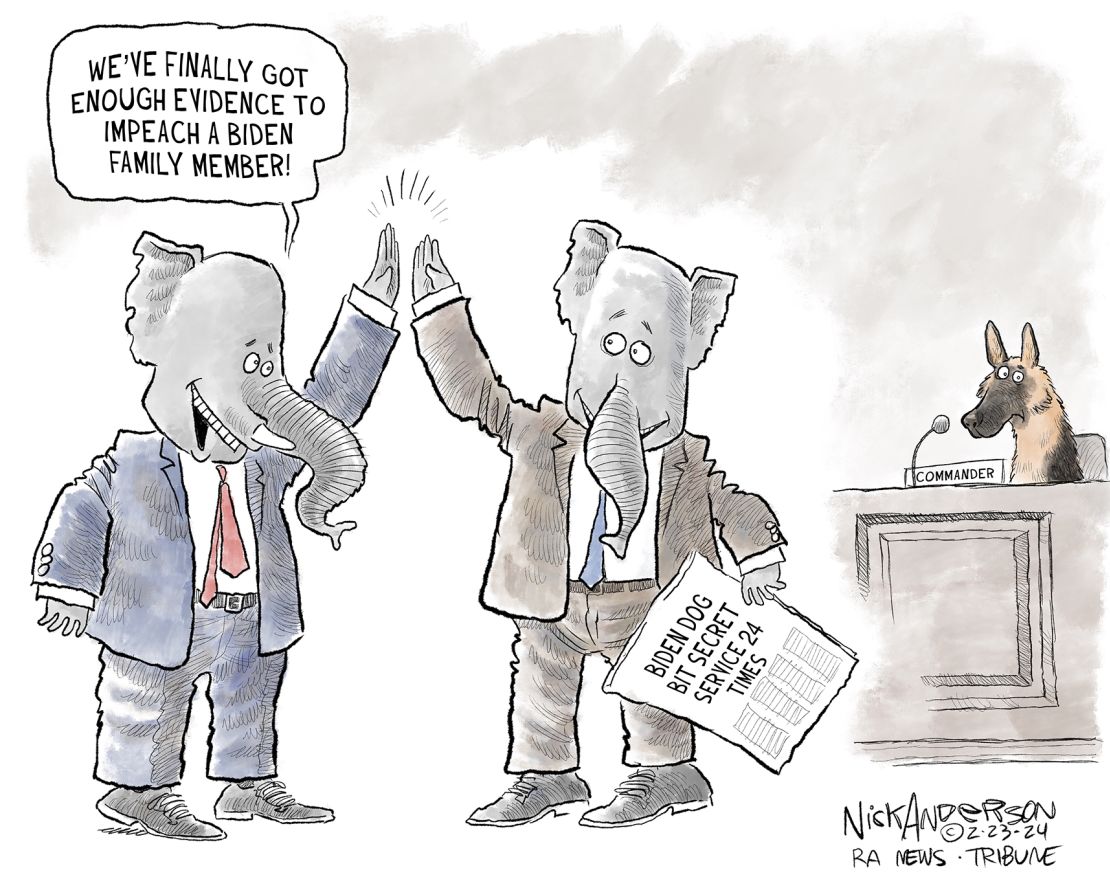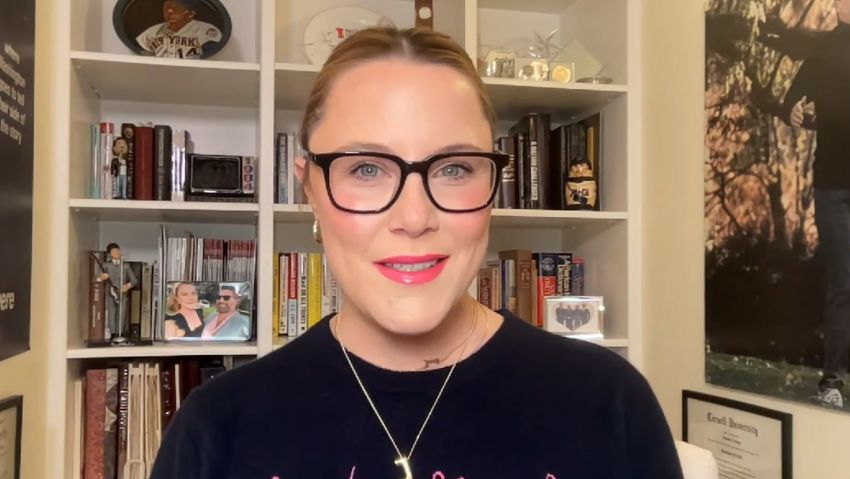Editor’s Note: Sign up to get this weekly column as a newsletter. We’re looking back at the strongest, smartest opinion takes of the week from CNN and other outlets.
CNN
—
“I planned each charted course, each careful step along the byway,” goes the song written for, and made famous by Frank Sinatra. “I did it my way.”
As mourners looked on, the coffin of Russian opposition leader Alexey Navalny was lowered into the ground Friday in Moscow to the sounds of “My Way.”
The lyrics, set to a French tune, “Comme d’habitude,” were written by Paul Anka in 1968 and inspired by a dinner he had with Sinatra in Miami. “He told me that he was retiring. … He was tired. He was being hassled by the FBI and all that kind of stuff.” As Anka wrote the song, he tried to channel Sinatra’s language, later citing the line, “I ate it up and spit it out” as an example.
“That is the way he spoke,” Anka told Ed Masley of the Arizona Republic.
It turns out that Navalny’s chief antagonist, Russian President Vladimir Putin, is also a fan of “My Way.” Anka recalled, “When I went to Russia, he’s walking me through the museum and giving me caviar out of tubs, loving ‘My Way.’” The song is also hugely popular in the US, where newly inaugurated President Donald Trump and first lady Melania Trump chose it for their first dance at the Liberty Ball in 2017.
“I faced it all and I stood tall,” is one line in the song that seems an apt description of Navalny’s crusade for freedom in a repressive system. A year ago, Odessa Rae, one of the producers of the CNN Film “Navalny,” told CNN Opinion that “Navalny is fighting for a better, more prosperous, fair and democratic Russia” and that he had released a 15-point plan for Russia after the Ukraine war: “It is like a breath of fresh air.”
“My Way” feeds the notion, despite all, that we are in control of the lives we lead, but charting a course isn’t the same thing as being able to fully follow it. Trump and President Joe Biden are on course to win their party’s nominations for president, yet both faced sizable opposition from voters in the Michigan primary Tuesday. And there were other powerful figures who saw their hopes and plans endangered last week.
Special counsel Jack Smith, who’s seeking to try Trump in two criminal cases before the November election, could be stymied by the Supreme Court’s decision to take up Trump’s claim that he should be immune from criminal prosecution for actions during his presidency.
Senate Minority Leader Mitch McConnell, once the undisputed architect of Republican strategy on Capitol Hill, announced Wednesday that he would step down in November as leader of his chamber’s Republicans. McConnell cited the death of his sister-in-law and the fact that he has turned 82 as factors in his decision to leave the post, but historian Julian Zelizer argued that the hostility Trump has expressed to his party’s Senate leader is surely a consideration.
“The truth is now painfully apparent: Trump and the GOP are one and the same. The anti-Trump coalition within the Republican Party is small and hanging on by a thread, and there is little chance of that changing in the short term. McConnell’s decision to cede the leadership position is part of a broad and consistent pattern: Every major figure who tries to take on the Trump-oriented GOP faction ends up losing.”
And Putin himself gave a bellicose, two-hour-plus state of the nation address to Russia’s parliament Thursday, brandishing Russia’s nuclear weapons as a threat against the West, after French President Emmanuel Macron said he couldn’t rule out sending Western troops to Ukraine. Putin’s need to invoke the nuclear option — and ultimately the “destruction of civilization” — seemed to betray the president’s frustration that his two-year-long war has yet to subdue the much smaller nation of Ukraine. It may not go his way, but the failure of Congress to approve more aid to Ukraine likely is giving Putin hope.
Mark T. Esper served as defense secretary for part of the Trump administration, but differs with the former president on aiding Ukraine. “As Russia resurges in Ukraine and proxy fights expand across the Middle East,” Esper wrote, “one critical question weighs heavily in everyone’s minds: Is the United States still a credible ally willing to lead the free world? Whether Congress chooses to provide the continued financial support Ukraine, Israel and Taiwan desperately need will go a long way toward answering this question. And make no mistake, it is not just our allies who are wondering. Our adversaries are paying close attention as well.”
By agreeing to hear Trump’s immunity argument, the Supreme Court has effectively delayed Trump’s trial in Washington, DC, on charges of trying to overturn the 2020 election he lost.
The high court’s “brief order was met with outrage and indignation from many — who complained that, by keeping the case from going forward immediately, the justices were almost guaranteeing that the crucially important January 6 case cannot go to trial before the presidential election this November, and that the justices were thus complicit in Trump’s transparent efforts to delay accountability,” wrote journalist Dahlia Lithwick and law professor Steve Vladeck. The court said it would hear arguments on the case during the week of April 22.
While the political clock is ticking, this isn’t a legal emergency, they wrote. “We both keep wishing that the Supreme Court would treat political exigencies with at least the same expediency with which it handles the legal ones. But wish as we might, that just isn’t in the court’s job description, and indeed at its best, the court should try to ignore political clocks as much as possible.”

Trump won 68% of the votes in Michigan Tuesday. Biden did even better, garnering 81% of the Democratic votes. Yet commentators noted the relatively large numbers of dissatisfied voters who either went for Nikki Haley or for the “uncommitted” option challenging Biden.
“Biden is counting on the specter of Trump to woo young, progressive voters back to the fold,” David Axelrod noted. “Expect his campaign to strike a sharp contrast with Trump on a range of issues, including abortion rights, climate change and student loan forgiveness to rebuild this element of his coalition.” He also has to win back voters dissatisfied with Biden’s handling of the war in Gaza.
On the GOP side, Haley’s “presence in the race continues to underscore Trump’s substantial vulnerabilities. By portraying the former president as a legally-freighted, vengeful chaos machine, Haley is articulating concerns shared by voters, particularly in the suburbs, who Trump will need in November.”

For more:
Julian Zelizer: Some very worrying signs for Joe Biden
John Halpin: In the Michigan primary, Biden shouldn’t fear Rashida Tlaib’s threats
Sophia Nelson: Trump courts Black votes through offensive remarks

The population of Rafah in southern Gaza has more than quadrupled since the war began, wrote Catherine Russell, executive director of UNICEF. “Gazans sheltering in Rafah now face the terrifying reality that large-scale military operations could be imminent in the very area where they have fled for refuge. They cannot be pushed farther, however, and there is no safe place to go in the north.”
Writing before the deaths of more than 100 people seeking aid Thursday in northern Gaza, Russell added, “Parties to the conflict should urgently implement a permanent humanitarian ceasefire so that our group and other humanitarian agencies can help to roll out the massive, multi-agency operation that is so desperately needed. … The destruction of Gaza and killing of civilians will not bring peace or safety to the region. That can only be achieved with a negotiated political solution, one that prioritizes the rights and well-being of this and future generations of Israeli and Palestinian children.”
Talks continue on a possible deal to free at least some of the remaining Israeli hostages held by Hamas, in return for a pause in fighting and the release of Palestinians imprisoned by Israel.
Ofri Bibas Levy, the sister of Israeli hostage Yarden Bibas, is watching closely.
Yarden was taken from Kibbutz Nir Or on October 7, along with his wife Shiri Bibas and their two sons Ariel, 4, and Kfir, 1, the youngest hostages held in Gaza.
“We, their family members, do not know if the boys are dead or alive, if they are being properly fed, if they are being held with or apart from their mother,” Levy wrote. “My brother Yarden was separated from his wife Shiri and their children on October 7th. He was forced by Hamas to be filmed in a psychological terror video alleging that they were killed by Israel.”
“As the months go by, I wonder: Have the mothers and fathers of the world forgotten them? What if Ariel and Kfir were your children, your nephews?”
“Has this become the world’s new normal? Is it no longer barbaric to take children as hostages? This cannot be acceptable. We demand that, in any hostage deal, the children must be released first.”
For more:
Frida Ghitis: This election, Americans are shedding an ugly stereotype

The Alabama Supreme Court ruling that endangered IVF procedures in that state is broadly unpopular with Americans. Roughly two-thirds of Americans disapprove of the decision, SE Cupp noted.
Some Republicans have “blocked bills to protect access to abortion, contraception, and now IVF. Overturning Roe, and all of the fallout that came from it, will continue to haunt Republicans, and at the worst possible time — in an election year,” Cupp said.
“But don’t tell them — they seem determined to become utterly irrelevant.”

SE Cupp: The issue that will continue to haunt Republicans
Republicans have chosen a senator from Alabama to give the rebuttal to Biden’s State of the Union address next Thursday. Katie Britt opposes abortion but favors protecting access to IVF.
Until Elena Sheppard got to college, she knew little about pivotal figures in women’s history. “I had sort of learned about the first ladies (but really just because I’d learned about their husbands) and I’d learned about Betsy Ross (whose legacy as the one to sew the first American flag fits right into historic narratives about women’s work),” Sheppard wrote.
“But while sitting in a first-year college lecture about women’s roles throughout our nation’s growth, I remember feeling stunned that I hadn’t heard most of these names before: Dorothea Dix and her 19th century work to fundamentally change the medical field; Lucy Delaney, the formerly enslaved activist and memoirist; even Elizabeth Cady Stanton, 19th century leader of the women’s rights movement, who occupied only a pullout blurb in my high school textbook.”
As Women’s History Month begins, Sheppard backed a campaign by two high school history teachers, Kristen Kelly and Serene Williams, to create an AP US Women’s History Course. “Women’s stories should be fully integrated in our national narrative, and we should be teaching our students as much.”

For the first time since 2019, immigration is ranked by Americans as the most important problem in the US, according to Gallup’s latest survey. That helps explain why both Biden and Trump made visits to the southern border Thursday.
“If Biden wants to improve his standing with voters,” wrote Jon Gabriel, “a Brownsville photo won’t cut it. He needs to stop posing and start acting. Whether he likes it or not, his predecessor allowed far fewer migrants into the country with the same laws on the books.”
“Upon entering office, the president rolled back most of Trump’s immigration measures. But what was removed by the pen can be restored by the pen, an approach sources say Biden is already considering. This would at least mitigate Biden’s polling drop while also giving border states and blue cities a respite from the migrant influx.”
As Gabriel noted, “This week, New York City Mayor Eric Adams said the city needs to amend its ‘sanctuary city’ law so that migrants who commit felonies can be turned over to Immigration and Customs Enforcement.”
The suspect in the killing of Laken Riley, a 22-year-old nursing student found dead after jogging on the University of Georgia campus, is an undocumented migrant from Venezuela, Raul A. Reyes noted.
Riley’s death “has resulted in a renewed firestorm over illegal immigration. Congressional Republican lawmakers have called for an immigration crackdown, and former President Donald Trump has denounced the suspect as a ‘monster.’”
“Riley’s death is a tragic loss to her family and community. The conflation of her killing with a migrant crime wave, however, is misplaced,” he observed.
“Study after study has found no conclusive link between immigrants and crime. In 2023 Stanford University researchers found that such a connection was ‘mythical’ and unsupported by 140 years of data.”

Van Jones: Going home, I encountered a huge problem
Ariel Dorfman: A wildfire destroyed the tree I planted seven decades ago — and with it my hope for the future
Dean Obeidallah: Shane Gillis is living proof that all too often, bigotry sells
Noah Berlatsky: ‘Dune: Part Two’ falls into a familiar — and telling — trap
Kellie Carter Jackson: What Oprah’s departure from WW means for the rest of us
Lev Golinkin: Parents who fear a leap day birthday are making a big mistake
Josephine Apraku: What it means to be born Black in Germany
Jill Filipovic: Jodie Turner-Smith is telling the truth about divorce
Michael Bociurkiw: Even if Ukraine announced mass mobilization, who is left to fight?
Anna Arutunyan: The uncomfortable truth about Ukraine’s goal
AND…
Wendy’s CEO Kirk Tanner stirred controversy when he recently suggested that the fast-food chain would use its new digital menu technology to introduce “dynamic pricing.”
“That’s a pricing strategy we’ve all come to know and despise in transportation,” wrote Jeff Yang.
“The most enraging modern variant of this is the rideshare industry’s use of surge pricing, which automatically sends the cost of a pickup from services like Uber and Lyft soaring when the number of exhausted people trying to get home exceeds the number of frustrated drivers trying to meet frenzied demand.”
Wendy’s attempted to calm the waters by saying it doesn’t plan to raise prices during peak times but instead is aiming to provide discounts “particularly in the slower times of day.”
Yang was not reassured. “Discounts at odd hours might pull in some marginal customers,” he observed, “but not knowing how much of a hit your wallet might take when you’re craving a Dave’s Double adds a layer of unnecessary anxiety to a world that already frequently feels like it’s on the brink of the existential abyss, which could push away customers more generally.”
Credit: Source link




